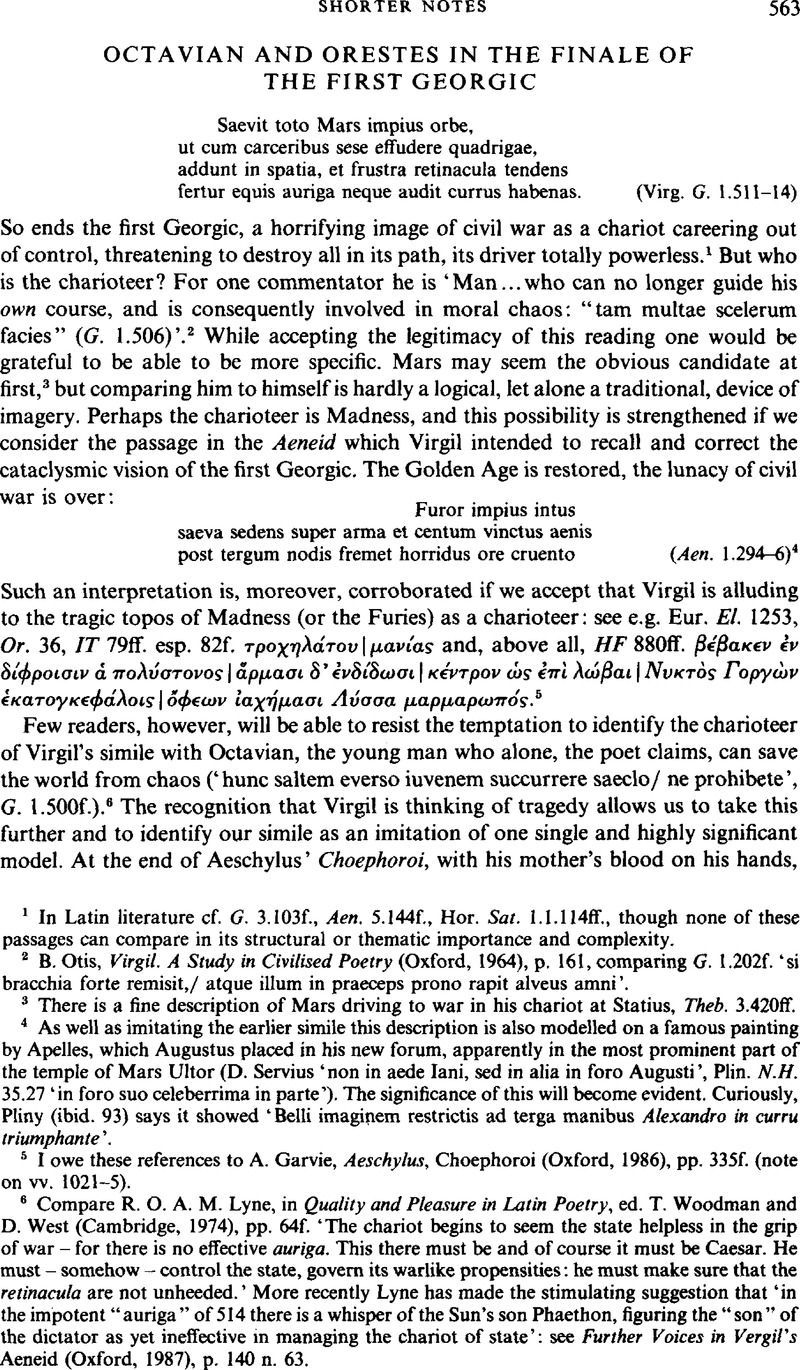Article contents
Octavian and Orestes in the Finale of the First Georgic
Published online by Cambridge University Press: 11 February 2009
Abstract

- Type
- Shorter Notes
- Information
- Copyright
- Copyright © The Classical Association 1988
References
1 In Latin literature cf. G. 3.103f., Aen. 5.144f., , Hor.Sat. 1.1.114ff.Google Scholar, though none of these passages can compare in its structural or thematic importance and complexity.
2 Otis, B., Virgil. A Study in Civilised Poetry (Oxford, 1964), p. 161Google Scholar, comparing G. 1.202f. ‘si bracchia forte remisit,/ atque ilium in praeceps prono rapit alveus amni’.
3 There is a fine description of Mars driving to war in his chariot at Statius, , Theb. 3.420ffGoogle Scholar.
4 As well as imitating the earlier simile this description is also modelled on a famous painting by Apelles, which Augustus placed in his new forum, apparently in the most prominent part of the temple of Mars Ultor (D. Servius ‘non in aede Iani, sed in alia in foro Augusti’, , Plin.N.H. 35.27Google Scholar ‘in foro suo celeberrima in parte’). The significance of this will become evident. Curiously, Pliny (ibid. 93) says it showed ‘Belli imaginem restrictis ad terga manibus Alexandro in curru triumphante ’.
5 I owe these references to Garvie, A., Aeschylus, Choephoroi (Oxford, 1986), pp. 335fGoogle Scholar. (note on w. 1021–5).
6 Compare R. O. Lyne, A. M., in Quality and Pleasure in Latin Poetry, ed. Woodman, T. and West, D. (Cambridge, 1974), pp. 64fGoogle Scholar. “The chariot begins to seem the state helpless in the grip of war – for there is no effective auriga. This there must be and of course it must be Caesar. He must – somehow – control the state, govern its warlike propensities: he must make sure that the retinacula are not unheeded.’ More recently Lyne has made the stimulating suggestion that ‘in the impotent“ auriga ” of 514 there is a whisper of the Sun's son Phaethon, figuring the “ son ” of the dictator as yet ineffective in managing the chariot of state': seeFurther Voices in Vergil's Aeneid (Oxford, 1987), p. 140 n. 63Google Scholar.
7 Compare also Aesch, . PV 883fGoogle Scholar. ἔξω δὲ δρόμου ϕέρομαι λύσοης | πνεύματι μάργῳ γλώσσης ἀκρατής.
8 Line 471 is in part an imitation of Od. 1.30 τόν ῥ’ Ἀγαμεμνονίδης τηλεκλυτὸς ἔκταν’ Ὀρέστης. In both cases the sonorous patronymic is no doubt intended to draw attention to Orestes' role as his father's avenger.
9 Highet, G., The Speeches in Virgil's Aeneid (Princeton, 1972), pp. 171Google Scholar (comparing Agam. 747–9 and Aen. 4.573) and 229f. (comparing Agam. 1280 and Aen. 4.625).
10 CompareTac, . Ann. 1. 9Google Scholar. ‘pietate erga parentem et necessitudine rei publicae, in qua nullus tune legibus locus, ad arma civilia actum’; 1.10 dismisses this claim as a ‘fraudulent pretext’ (Syme, R., The Roman Revolution (Oxford, 1939), p. 157)Google Scholar.Suet, . Aug. 10Google Scholar also hints at political expediency as the real motive: ‘nihil convenientius ducens quam necem avunculi vindicare tuerique acta.’
11 Vowed in 42 B.C. and finally dedicated in 2 B.C. Compare RG 21.1, and see alsoSuet, . Aug. 29. 2Google Scholar,Ov, . Fast. 5. 567ffGoogle Scholar.
12 Syme, , op. cit. (n. 10), p. 191Google Scholar.
13 Suet, . Aug. 27. 1Google Scholar ‘restitit quidem aliquamdiu collegis ne qua fieret proscriptio, sed inceptam utroque acerbius exercuit.’ Suetonius also records various horror stories of both the proscriptions (Aug. 13) and the capture of Perusia (Aug. 15).
14 Compare also 2.510 ‘gaudent perfusi sanguine fratrum.’ Augustus later claimed (RG 3) that he had spared every citizen who had asked for clemency.
15 To the curse of the house of Tantalus (Aesch, Agam. 1186ff.)Google Scholar cf. Virgil's allusion to the curse of Laomedon (G. 1.501 f.; also Aen. 4.541f.).
16 Pathos is also present for any reader who feels that 'fertur equis auriga' (G. 1.514) echoes Soph. El. 725 πὡλοι βίᾳΦέρουσιѵ (the false tale of the death of Orestes in a chariot race) or Eur. Hipp. 1224 βίᾳ Φέρουσιѵ (the death of Hippolytus).
- 3
- Cited by


